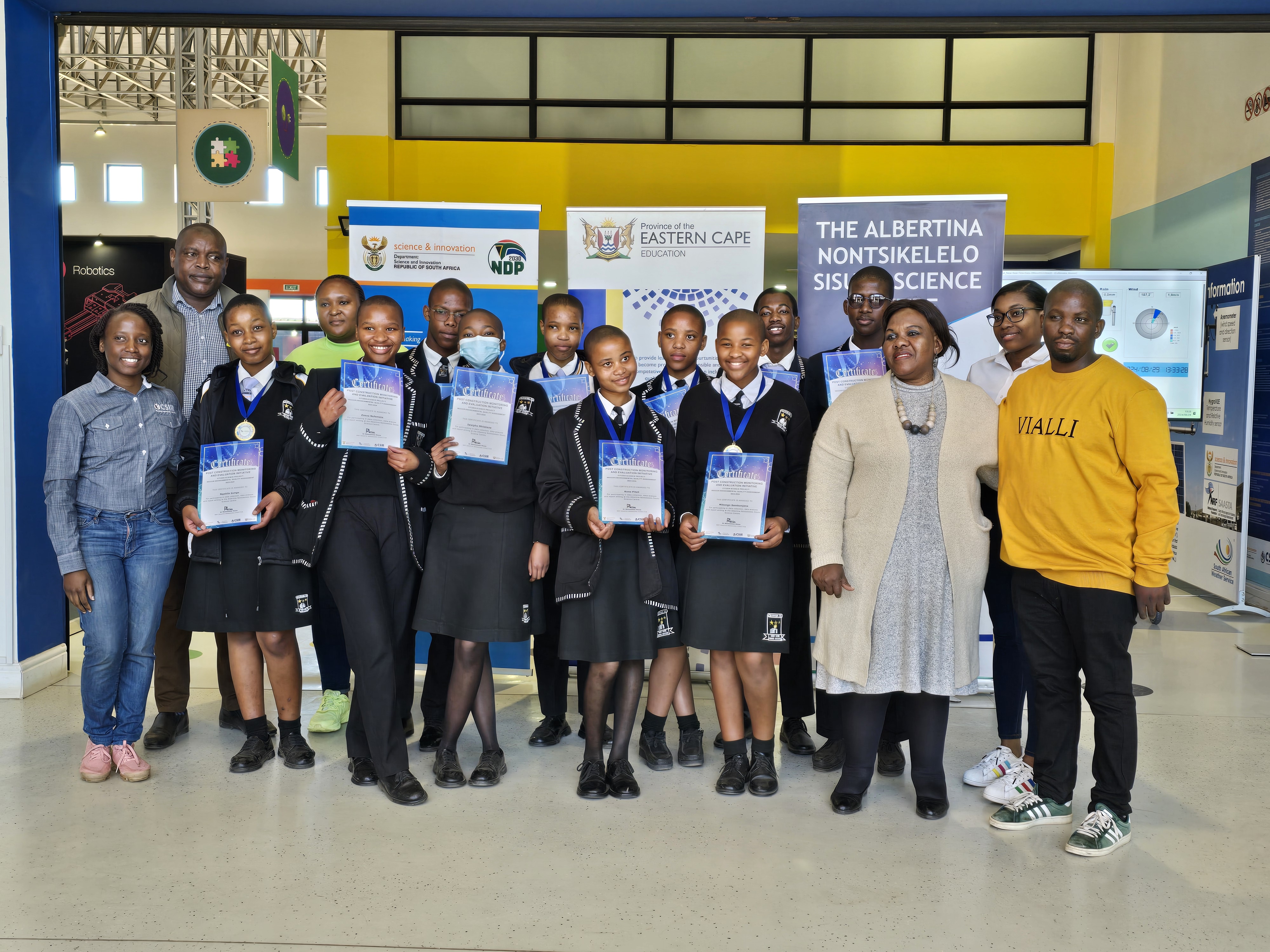Bridging the gap in data science by upskilling the next generation
On Thursday, 29 August 2024, the CSIR’s Dr Coralie van Reenen, who is the Infrastructure Innovation research group leader, and architectural researcher Tinashe Dube, attended the first awards ceremony of the Citizen Science Programme at the Albertina Sisulu Science Centre in Cofimvaba, in the Eastern Cape.

On Thursday, 29 August 2024, the CSIR’s Dr Coralie van Reenen, who is the Infrastructure Innovation research group leader, and architectural researcher Tinashe Dube, attended the first awards ceremony of the Citizen Science Programme at the Albertina Sisulu Science Centre in Cofimvaba, in the Eastern Cape.
Van Reenen says, “It was heart-warming to see the first cohort of learners graduate and pass the baton of research activities to the new cohort of Grade 10 and 11 learners. Their active participation in training the new group demonstrated the skills that they have developed over the past year.”
As part of the Department of Science and Innovation (DSI) project for the monitoring and evaluation of the Albertina Nontsikelelo Sisulu (ANS) Science Centre’s building performance in Cofimvaba, the Council for Scientific and Industrial Research (CSIR) has been a part of developing a Citizen Science Programme. Through this programme, citizens (in this case, high school learners) assist the CSIR in collecting building performance data on a regular (weekly) basis and the CSIR team provides workshops to train the citizens in the data collection and analysis process and to conduct building science experiments at least once a year.
Additionally, in the ongoing data collection activity, learners pair up and use hand-held monitors to measure building performance metrics and record the data in the BROAD app, a CSIR-developed app for collecting data, on tablets provided to the Science Centre by the CSIR.
Data about air quality and efficacy of the passive ventilation system (measured in terms of carbon dioxide content), thermal comfort (temperature and relative humidity), lighting comfort and acoustic comfort are collected weekly.
Recently, the CSIR provided a workshop on data analysis, teaching the learners how the data are downloaded from the cloud and analysed to evaluate the efficacy of the building design, which is intended to passively provide sufficient lighting, thermal comfort and ventilation throughout the year.
The learners were also trained in conducting citizen environmental noise assessments and participated in a ‘sound walk’ in Cofimvaba village. They will continue to submit data from their communities to enable the production of a community noise heat map.
In 2023, the learners participated in an experiment on classroom acoustics to establish the efficacy and economic efficiency of various material options to reduce the reverberation time in classrooms at the Science Centre. The findings were presented at the meeting of the Acoustical Society of America in Sydney, Australia, in December 2023.
Dube says, “It is quite inspiring to see the learners embrace the project content with a level of seriousness, which will definitely make a difference in their academic achievement trajectories for the future.”
On Thursday, 29 August, the CSIR, Eastern Cape Department of Education and the South African Agency for Science and Technology (SAASTA) presented awards to the outgoing cohort of 20 learners and welcomed the incoming cohort of 20 learners to the programme.
The outgoing group demonstrated their level of learning and leadership skills as they trained the new group on collecting data. Learners and teachers from the schools gave testimony of the value they have found in the programme.
It is envisioned that, in the coming year, the programme will be extended to include the youth who are no longer in school to ensure that science, technology, engineering and maths skills development is not limited to school children only.
The CSIR continues to take the lead in ensuring accurate efficiency with the monitoring and evaluation of the centre’s building performance.

About the centre
The centre serves as an educational facility that offers science awareness activities and exhibits on various themes, including space science and astronomy.
Overseen and built by the DSI, with implementation support from the CSIR, the centre is designed and constructed as an innovative and sustainable building.
It features a hybrid power system with photovoltaic panels and a small-scale wind turbine charging a bank of batteries. Energy from power utility Eskom is only used as backup. Greywater and rainwater are treated onsite and used for non-potable water applications.
About the programme
This innovative model of scientific exploration democratises science by inviting people from diverse backgrounds to participate in a wide range of research projects. The key principle is that everyone can be a scientist, regardless of age, expertise, or location.
The Citizen Science Programme runs a new project every year based at the ANS Science Centre, some of which are ongoing multi-year projects and others which are short-term experiments. The programme was conceived by the DSI and is hosted by the Science Centre. SAASTA is responsible for ongoing programme monitoring, and the CSIR provides technical and scientific input to the projects. All the projects focus on building science, linking themes touching on the school science curriculum with real-life application.


